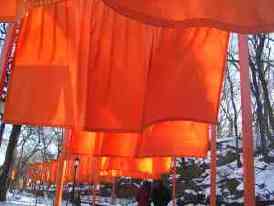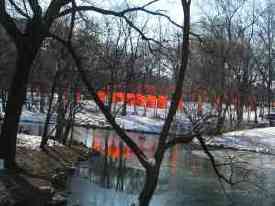So . . . .about two weeks ago I had a dream, (actually more of a nightmare) in which I was asked to judge a contest to choose “the best photograph of the Gates” from among three million orange photos. Over the next few days, however, the more I thought about it,I became intrigued by the idea of seeing people’s different creative solutions to photographing the gates.
[Note: I loved the Gates. Ashton (partner-in-crime) and I were in the park almost every day we were in the city, we even gave a party for 150 friends who came from all over the world to walk through the park at dawn (see nifty video by alex itin, orange you glad).
On the last day Ashton and I walked through the park for seven straight hours with Rebeca Mendez and Adam Euwens — talking almost the whole time about the phenomenon of the Gates — as an art work that requires significant effort on the part of its audience; like all of Christo and Jeanne-Claude’s work, it requires you to be at a certain latitude and longitude at a specific moment in time; you need to see it from different vantage points at different times of the day; as Ashton said, “there are as many views of the Gates as footsteps in the park.”
And of course you talk endlessly to the people you meet along the way.
Early that last day, high up on the Harlem Meer, we came upon a big man with red orange hair who was quickly slipping a big coat over his obviously naked body. His friend had just as obviously been taking pictures. Ashton and Rebeca immediately realized that they were taking pictures of his orange pubic hair against the backdrop of the Gates. Impulsively I mentioned that I was planning to sponsor a contest for the best amateur photograph of the Gates. Surprisingly they wrote down a URL for the competition I made up on the spot. A few other times during the day I mentioned this to people who seemed to be taking interesting photos. Without any prompting, they also wrote down the URL.
So the next day, Monday, while sitting around the table with Kim, Dan, and Ben, my colleagues at the Institute for the Future of the Book, I mentioned the whole Gates photo idea and to my delight everyone thought it would fit in perfectly with our experiments in the area of open-ended networked “books.”
Voila — the beginning of the Gates Memory Project which we are launching today at gatesmemory.org. It’s quite a bit more ambitious than the original (and impossible) idea of choosing “the best photo.” Now we are aiming to to harness the creativity and insight of thousands to build a kind of collective memory machine — one that is designed not just for the moment, but as a  lasting and definitive document of the Gates and our experience of them. As Ben Vershbow says in the press release announcing the project, “The photographs are a jumping off point for further exploration. Ultimately, we are interested in collecting anything that can be shared over the web – film, audio, text – parodies and remixes.”
lasting and definitive document of the Gates and our experience of them. As Ben Vershbow says in the press release announcing the project, “The photographs are a jumping off point for further exploration. Ultimately, we are interested in collecting anything that can be shared over the web – film, audio, text – parodies and remixes.”
While the photos and stories are being collected, the institute will encourage discussion and debate on how best to present the archives in hopes of finding new, unexpected ways to view and bring meaning to the content. The institute also welcomes the possibility of collaboration with designers, developers and web curators. This project is the beginning of a long-term exploration for us. Through this work, we are asking: how do we use social software to create works that are in the spirit of the web – i.e. free-form, ad hoc, always evolving, and driven by people’s enthusiasm to share – but are also edited and shaped into something of lasting value? It is that tension – between frozen and fluid works – that we aim to explore. We are excited to see the ideas people will bring to the table.
See the complete call for the project HERE.
if:book
A Project of the Institute for the Future of the Book
